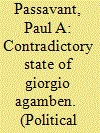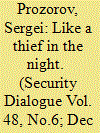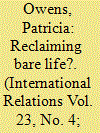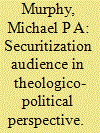|
|
|
Sort Order |
|
|
|
Items / Page
|
|
|
|
|
|
|
| Srl | Item |
| 1 |
ID:
077228


|
|
|
|
|
| Publication |
2007.
|
| Summary/Abstract |
I argue that Giorgio Agamben employs two, contradictory theories of the state in his works. Earlier works, such as The Coming Community and Means without End, suggest that the state today functions as an aspect of the society of the spectacle where spectacle is the logical extension of the commodity form under late capitalism. This part of Agamben's work attributes a determined character to the state and a determining power to the economic forces of capitalism that conditions particular forms of the state. Later work, such as Homo Sacer: Sovereign Power and Bare Life and State of Exception, are preoccupied with the logic of juridical sovereignty and the increased frequency of states of emergency. This part of Agamben's work attributes a determining strength to the state under current conditions. Although his earlier work provides a more coherent narrative of how it is possible to move from contemporary society to ideal community, it does not provide the theory of political action necessary to overcome the power of the state he describes when he theorizes the state in Homo Sacer and State of Exception. None of the three possibilities of political action present in his later works provides passage beyond state sovereignty without violating his philosophical commitments.
|
|
|
|
|
|
|
|
|
|
|
|
|
|
|
|
| 2 |
ID:
092434


|
|
|
|
|
| Publication |
2009.
|
| Summary/Abstract |
This article is a response to calls from a number of theorists in International Relations and related disciplines for the need to develop alternative ways of thinking 'the border' in contemporary political life. These calls stem from an apparent tension between the increasing complexity of the nature and location of bordering practices on the one hand and yet the relative simplicity with which borders often continue to be treated on the other. One of the intellectual challenges, however, is that many of the resources in political thought to which we might turn for new border vocabularies already rely on unproblematised conceptions of what and where borders are. It is argued that some promise can be found in the work of Italian philosopher Giorgio Agamben, whose diagnosis of the operation of sovereign power in terms of the production of bare life offers significant, yet largely untapped, implications for analysing borders and the politics of space across a global bio-political terrain.
|
|
|
|
|
|
|
|
|
|
|
|
|
|
|
|
| 3 |
ID:
157099


|
|
|
|
|
| Summary/Abstract |
The article addresses the reinterpretation of the problematic of security in the messianic turn in contemporary continental political thought. I focus on Giorgio Agamben’s reinterpretation of Hobbes’s Leviathan in Stasis, which restores an eschatological dimension to this foundational text of modern security politics. Hobbes’s commonwealth has been traditionally read as a secularized version of the katechon, a force that restrains the state of nature while drawing on its resources. Instead, Agamben argues that for Hobbes, the state is neither the analogue of God’s kingdom on earth nor the katechon that delays its arrival, but the profane power that will disappear when the kingdom of God is established on earth. It is thus in principle incapable of attaining the peace and security that it claims to provide, perpetually producing insecurity and violence in the guise of protection. In Agamben’s reading, it is precisely this failure of the state’s security apparatuses that assists the advent of the messianic event in an oblique fashion. The exposure of this failure does not aspire to the improvement of the apparatuses of security or resign us to inescapable insecurity but only affirms the need to render the present apparatuses inoperative, bringing forth a future without them.
|
|
|
|
|
|
|
|
|
|
|
|
|
|
|
|
| 4 |
ID:
093674


|
|
|
|
|
| Publication |
2009.
|
| Summary/Abstract |
Giorgio Agamben claims that refugees can be seen as the ultimate 'biopolitical' subjects: those who can be regulated and governed at the level of population in a permanent 'state of exception'. Refugees are reduced to 'bare life': humans as animals in nature without political freedom. Contra Agamben, it will be argued here that if refugee populations are not to face some inexorable trend toward a rule of 'exception', then it will not be through reclaiming 'bare life'. It will be wholly dependent on the ability to forge a public realm grounded on the appropriate distinction between nature and political artifice, between human life and the political world. This argument is made through contrasting Agamben's writing on refugees with Hannah Arendt's. What is at stake in the difference is illustrated through the example of refugee lip-sewing.
|
|
|
|
|
|
|
|
|
|
|
|
|
|
|
|
| 5 |
ID:
172289


|
|
|
|
|
| Summary/Abstract |
Over the past two decades, securitization theory has developed into a robust literature of cases and critiques. The vast majority of the attention paid to securitization has been to the securitizing actor and the referent object, leaving the audience – the body that determines the fate of a securitizing move by accepting or rejecting the securitizing actor’s request – undertheorized. The audience is presented as a problematic contradiction, because as a collectivity called by the securitizing actor it appears to be a passive body, critiqued thereby as potentially irrelevant. On the other hand, both the original Copenhagen school formulation of securitization theory and many of its current theorists reaffirm the agency of the audience to actively determine the success or failure of the securitizing move. This article turns to political theology for guidance, and explains the contradiction of the passive/active audience through homology to the ekklesia and the acclamation of ‘amen’ in liturgical doxology. The fact that the congregation is passive recipient of a call does not negate the essential and substantial role that it must actively play, just as the contradiction of the passive/active description of the securitization audience is not a problem of illogic, but a paraconsistent truth.
|
|
|
|
|
|
|
|
|
|
|
|
|
|
|
|
|
|
|
|
|